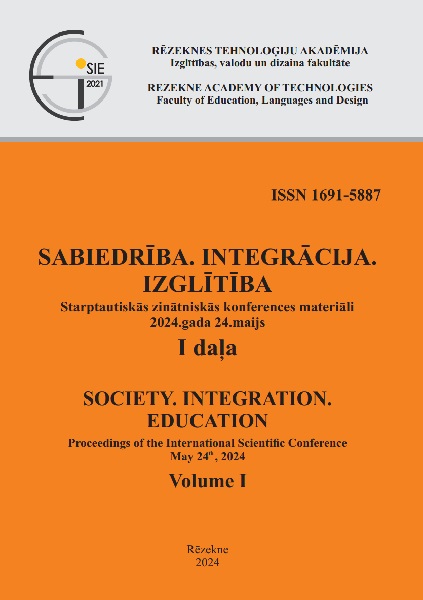TUTORING AS A MEANS OF INDIVIDUALIZING THE EDUCATIONAL PROCESS: AN EXPERIMENTAL STUDY
DOI:
https://doi.org/10.17770/sie2024vol1.7924Keywords:
educational process in a higher education institution; individualization; master's students; tutoring support; tutoring technology; university teachersAbstract
The new information type of society has qualitatively changed the concept of training future specialists. Currently, technocratic relations in the "teacher-student" system are being replaced by humanistic ones, with a transition to cooperation with students as active subjects of the individualized educational process.
The authors of the article, taking into account the European experience of individualizing education, analyzed the peculiarities of using tutoring technology as a means of individualizing the education of master's students in the conditions of mixed education.
The results of the ascertaining stage of the pedagogical experiment, the participants of which were teachers and master's students of Dragomanov Ukrainian State University (Kyiv), National Technical University “Kharkiv Polytechnic Institute” (Kharkiv), Vinnytsia Mykhailo Kotsiubynskyi State Pedagogical University (Vinnytsia), are presented.
The purpose of the confirmatory experiment was to identify the level of understanding of university teachers, as well as master's students – future teachers of the essence of tutoring technology and the presence of experience in using it in professional activities.
The article proves that the use of tutoring technology in conditions of mixed learning allows students of higher education to gain experience in independent planning, obtaining and improving educational results. It is substantiated that the acquisition of such experience takes place during the work of tutors (with systematic tutoring support) on individual tutorials, which contain multi-level complex tasks from a certain educational subject. The role and place of the scientific essay as a component of tutoring technology and as a means of individualizing the educational process, which ensures the development of independent creative thinking of students, the formation of their ability to structure information, skillful presentation of arguments, establish cause-and-effect relationships, and formulate conclusions, is characterized.
References
Bennett, S. & Marsh, D. (2002). Are We Expecting Online Tutors to Run Before They Can Walk? Innovations in Education and Teaching International, 39(1), 14–20. DOI: 10.1080/13558000110097055
Demyanenko, N. (2020). Internationalization of the educational and scientific space at pedagogical university. The World Space of Higher Education: Trends in Internationalization and Development: the collective monograph / Demyanenko N.М., Benera V.E., Kolyadenko S.М., Sytniakivska S.М., Kravchenko I.М., Lomakovych V.Ya., Syrotyuk M.V., Smikal V.O., Borova V.E., Malinovska N.V. / Edited by N. Demyanenko. Warsaw: RS Global Sp. Z O.O., 11-27. DOI: 10.31435/rsglobal/020
Derba,T. (2011). Tutor’s Functional Responsibilities of Pupils Distance Learning. ITLT, 19(5). DOI:10.33407/itlt.v19i5.348
Gupta, A. (2022). Social legitimacy of private tutoring: an investigation of institutional and affective educational practices in India. Discourse: Studies in the Cultural Politics of Education, 43(4), 571-584. DOI: 10.1080/01596306.2020.1868978
Lokareva, K. & Bazhmina, Е. (2021). Personalization In Education: Students Managing Their Learning By Means Of Digital Technologies, ITLT, 86(6), 187–207. DOI: 10.33407/itlt.v86i6.4103
López-Gómez, E. , Leví-Orta, G., Medina Rivilla, A. & Ramos-Méndez, E. (2020). Dimensions of university tutoring: a psychometric study. Journal of Further and Higher Education, 44(5), 609-627. DOI: 10.1080/0309877X.2019.1571174
Simons, M. (2021). The figure of the independent learner: on governing by personalization and debt. Discourse: Studies in the Cultural Politics of Education, 42(6), 813-827. DOI: 10.1080/01596306.2020.1732302
Sriprakash, A., Proctorb, H. & Hu, B. (2016). Visible pedagogic work: parenting, private tutoring and educational advantage in Australia. Discourse: Studies in the Cultural Politics of Education, 37(3), 426-441. DOI: 10.1080/01596306.2015.1061976
Sysoieva, S. & Osadcha, K. (2020). Formation of the Tutor Ict-Competence In The Process Of Future Teachers’ Professional Training. ITLT, 80(6), 207–221. DOI: 10.33407/itlt.v80i6.4182
Yung, K.W.H., & Yuan, R. (2020). The most popular star-tutor of English: discursive construction of tutor identities in shadow education. Discourse: Studies in the Cultural Politics of Education, 41(1), 153–168. DOI: 10.1080/01596306.2018.1488241
Zhang, L., Pan, M., Yu, S., Chen, L. & Zhang, J. (2023). Evaluation of a student-centered online one-to-one tutoring system. Interactive Learning Environments, 31, 4251-4269. DOI: 10.1080/10494820.2021.1958234






